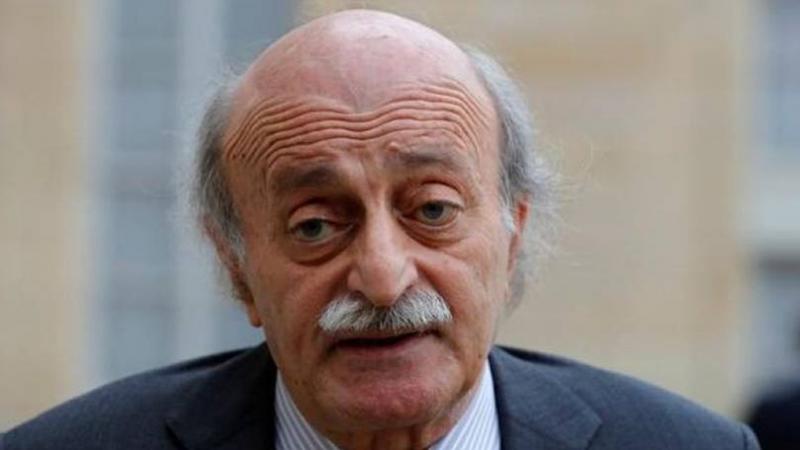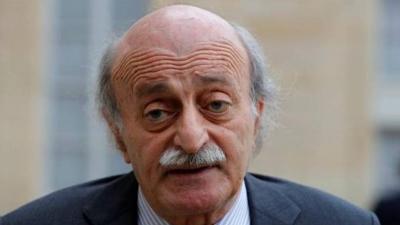As soon as the head of the Progressive Socialist Party, Walid Jumblatt, confirmed the "necessity of dialogue with Hezbollah" in a television interview on the ninth of this month, questions arose regarding the reason behind his retreat from the positions on which he based his electoral battle. This curiosity increased after his meeting last week with a delegation from the party led by Assistant Secretary General Hussein Khalil, which raised inquiries about the background of his shift, often reflective of events he "reads" or "predicts."
Questions focused on whether Jumblatt's recent "movement" is the result of personal calculations or whether it is coordinated and studied with foreign entities, especially the United States, and whether Riyadh is aware of his upcoming steps. Meanwhile, it seems that Jumblatt is preparing for the coming days with a "truce" with Hezbollah, distancing himself by stating he is free from any confrontation with them.
Unlike previous occasions, the meeting lasted for fifty minutes during which Jumblatt raised several questions and inquiries that "plague his mind," which he had noted on a blank paper. He began the meeting by referencing the remarks of Hezbollah's Secretary General, Sayyed Hassan Nasrallah, about the necessity of forming a strong government with full powers, asking if the party had any information or expectations regarding the impossibility of electing a president in the scheduled timeframe. The response was that "the party is striving for both [government and president]. It wants to elect a president and form a government."
Jumblatt expanded on the discussion, affirming that "it is in the country's interest to look for a non-provocative president because our circumstances do not allow otherwise," stating, "I will start with myself and my allies. I will not name a confrontational president but believe that the next president must, at the very least, enjoy the consensus of all parties." Jumblatt pointed out that "there are madmen in the country who would not mind dragging it into civil war again," indicating that "if it weren't for the party's wisdom in the Tayouneh incident, we would have been in a different place."
The leader of the Chouf did not enter into names, but it was clear he was referring to Samir Geagea and Gibran Bassil, contenting himself with setting general criteria and characteristics that were endorsed by the party delegation, which confirmed that "the name of the president requires consultation."
Jumblatt expressed interest in the details of the maritime demarcation file in the south, returning to it whenever he finished asking about a particular point. After attempting to link the sending of three drones over "Karish" to the nuclear file, inquiring from the delegation about the likelihood of a war, he responded after hearing confirmation that "all options are open because we will not allow ourselves to die in queues, and we will not remain silent about Lebanon being deprived of benefiting from its gas wealth," stating that "Lebanon has become worse than Gaza, and the dire conditions do not permit war," urging the delegation to convey to Nasrallah that "negotiation is better than war."
In the course of discussing the country's situation and affirming that "the corruption of officials has led to the current state," Jumblatt responded to Khalil's remarks about the American blockade by stating that "he asked the American ambassador, Dorothy Shea, about preventing her country from transferring electricity and gas from Egypt and Jordan to Lebanon, and she denied this, indicating that they condition upon raising the tariff and forming a regulatory commission." Khalil replied, "This matter is the government's concern, and if they wanted to help Lebanon, they would not have prevented electricity supplies."
Jumblatt then returned to the demarcation and gas file, inquiring about the idea of forming a national company to manage this sector, "similar to what happens in Saudi Arabia and Iran," a concept that the party delegation confirmed is "open to discussion," recalling the proposal of the sovereign fund mentioned by Speaker Nabih Berri.
While a question about the party's stance on the International Monetary Fund was raised, Jumblatt touched on other topics including the situation of private universities and schools, stressing the need for a plan to curb this drain of resources. He also addressed the issue of smuggling to Jordan via Syria, asking if the party could intervene with the Syrian government to resolve this matter, to which the delegation affirmed that "the party does not allow itself to intervene with the Syrian state in these details. When we went to Syria, it was to help prevent war on Lebanon, and all the information we have regarding smuggling, we put in the hands of the security agencies."




